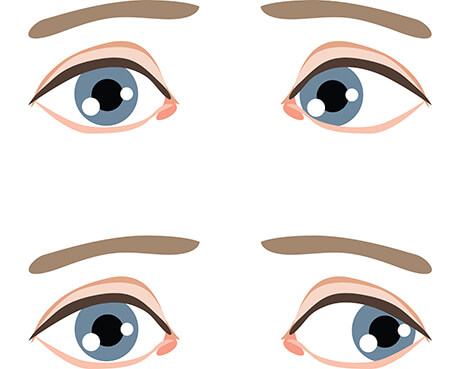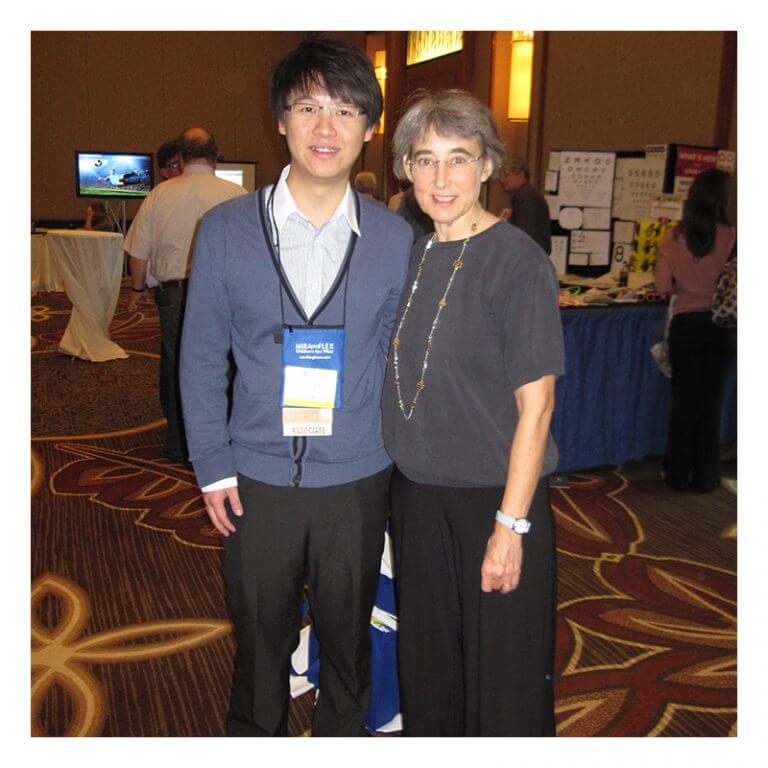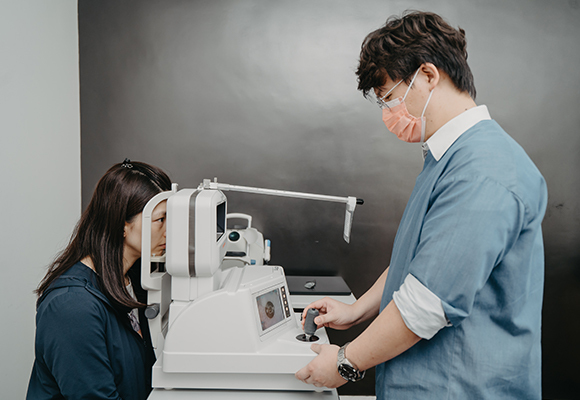Eye Turn (Strabismus, Mata Juling )
Child Strabismus is often called crossed eyes because the eyes can look like they are crossed, but it is an eye turn. Strabismus (Eye Turn, Mata Juling ) is a condition where the two eyes are not looking at the same point at the same time.
Based on the direction the eye turns, strabismus can be classified as an inward eye turning (esotropia), outward turning (exotropia), upwards turning (hypertropia), and downward turning (hypotropia).
Sometimes you can see the eye turn (Strabismus, Mata Juling ), and other times you can’t because it only turns when the child looks at objects up close or if he is tired or not feeling well.

What is the difference between Lazy Eye and Eye Turn?
Lazy eye is a problem with visual acuity in one or both eyes that cannot be improved with glasses or contact lenses alone. The brain suppresses the information from either one or both eyes and doesn’t send the visual signal to affected eye, make it eventually become weak. Eye turn also called “Strabismus” is a problem in which both eyes do not focus on the same point at the same time. The patients not necessarily require vision correction because they may have 20/20 normal visual acuity. They just suffer due to misaligned eye problem.
Why might your child have Eye Turn?
Eye turn can happen during the early childhood due to the genetic from family. It is normal for a newborn's eyes to cross sometimes during the first few months. By the time, the eyes usually straighten out. Generally, develops up to age 6 years. On the other hand, a child might be more likely to have an eye turn if they have developmental disabilities. This condition happens because the vision in the eyes might not develop the way it should.
Eye turn can result from strokes, car accidents, concussions etc. Research showed that 90% of traumatic brain injury (TBI) patients experience some of visual problems due to the disruption of communication between the eyes and the brain. Injury to any part of visual pathways can affect the field of vision, the position of the eye and how the eye moves.
Common Signs and Symptoms of Eye Turns (Strabismus, Mata Juling)
One eye seems to turn inward (esotropia) or outwards (exotropia), either constantly or occasionally
Both eyes turn inwards (esotropia) or outwards (exotropia)
Eyes don’t seem to move correctly; either constantly or occasionally
Squints or closes one eye
Covers one eye while reading or looking at something close up
Inability to respond to some visual stimuli
Difficulty following moving objects
Bumps into objects while walking
Trouble with depth perception
Poor eye-hand coordination (poor handwriting, for example)
Uses finger to keep place when reading
Skips words when reading out loud
Moves head when reading
Complains of blurry vision or double images (diplopia)
Has trouble seeing 3D
How would Eye Turn affect your child
Eye Turns (Strabismus, Mata Juling, ) can have a major impact on how the child functions in school or succeeds in life. Here are some of the examples:
- May experience double vision (diplopia) or/and blurry vision
- Frequent loss of place when reading
- Headaches, eye strain and inability to stay focused on a visual task for any period of time
- Seem to be clumsy or have a lot of accidents
- Turn head to see things
- Close one eye while reading
- Close up tasks become difficult
- Require good eye-hand coordination skills such as writing, drawing, throwing or catching a ball become difficult
- Poor self-esteem
Is it possible to fix the Eye turn for my child?
Golden/Critical Period
While you may have been told that there is a golden period where your child can treat Strabismus, and that after this period it is no longer possible for eye turning treatment - research has found that it is possible to correct this condition no matter how old your child is.
Through Behavioral and Developmental Optometry, we are able to help your child learn how to use their eyes correctly at any age. In order to see if we can help your child in treating vision problems eye turns (Strabismus, Mata Juling 斜视), schedule a Neuro-functional vision evaluation with our Behavioral and Developmental Optometrist.
Our Founder Mr Stanley with Dr Barry - Even Adults Can Be Helped with Neuro-Vision Therapy
Dr Susan R. Barry is a neuroscientist and a professor in the United States who has benefited from vision therapy as an adult. She shares her story in her book, Fixing My Gaze: A Scientist’s Journey into Seeing in Three Dimensions. In chapter 3, Dr. Barry even shares out her childhood experience after three strabismus surgeries:
“Even though my eyes appeared straight and aligned, I still didn’t use them normally. Both of my eyesights were 20/20 and had no problem passing a standard school vision screening. Yet, my vision was abnormal because I did not use my two eyes together. I was dreaded to go to grade school......when I looked down at the letters on the page, they didn’t stay in one place. My eye problem got worse as the print got smaller….”
Dr Barry did not have any developmental delays or challenges other than her vision. Imagine the amount of visual confusion that a special needs child experiences after eye surgery comparing to normal children. The good news is that we are able to help these children, normal or special needs, to treat their eye disorders without surgery (in most cases) and after surgery (for those who absolutely need it).
Available Eye Turn Treatment for Children in Malaysia
Understanding the different eye turn treatment has different efficiency to your child. However, the important part is how to fix the eye turn for your child? There are 3 approaches to treat the eye turn in Malaysia.
- Surgery:
The operation usually weakens or strengthens the muscles of the eye, so that the eyes can be aligned. However, surgery treatment can be an over or under correction of the squint, so it is necessary for more than one operation to obtain the best results.
- Botulinum toxin injection:
This injection weakens the eye muscles so that the eyes can be aligned. However, the effects are transient and can be sustained only with repeated injections, its effects in some types of squint can be permanent. This drug is seldom used in children.
- In Office Vision Therapy by Board Certified Vision Specialist, FCSO,FCOVD,FACBO)



